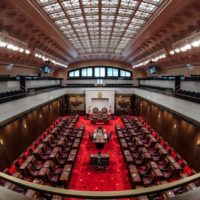
Senate Renewal
New Senate has renewed trust, diminished partisanship
The Government Representative Office in the Senate releases report on Canada’s 42nd Parliament.
Canada’s newly independent Senate successfully amended one third of government’s bills during its inaugural parliamentary session, while also communicating more broadly with Canadians and adding diversity to its ranks.
The results are included in a report from the Government Representative Office in the Senate (GRO), which reviews the Senate reform process since the Government began appointing independents.
“We have made important progress towards rebuilding trust with Canadians, who count on the Senate to comprehensively review and, when necessary, revise legislation developed by our elected representatives,” said Government Representative Peter Harder. “So far so good. But there is still work to be done to cement the advances we have made.”
- Read the full report: Towards an independent Senate: A progress report to Canadians
Currently, two thirds of Senators are independents, who no longer sit with partisan caucuses in the House of Commons. The new arrangement flows from a reformed selection process under which senators are appointed as independents.
Forty-seven per cent of senators are now women compared to 37 per cent at the end of the last Parliament, while there are now 12 senators with Indigenous backgrounds compared to five.
Aside from increased action on amending legislation, the current Senate has also refrained from using time allocation to cut off debate, stopped the use of party discipline in voting (for independents), strengthened proactive disclosure of senators’ expenses, introduced televised Senate proceedings and acted vigorously in disciplining members for unethical behaviour.
In sum, 29 out of 88 bills have been successfully amended by the Senate in the current Parliament. Some of the changes include:
- Ensuring fair legal protections against the revocation of Canadian citizenship;
- Securing commitments for Indigenous communities in relation to cannabis legalization;
- Contributing to comprehensive reforms to the criminal justice system, including bolstering Canada’s response to intimate partner violence;
- Securing an end to all gender discrimination in registration under the Indian Act;
- Upholding cooperative federalism regarding jurisdiction over consumer protection;
- Providing wider access to more competitive rail service in legislation to modernize federal transportation policies, including giving soybean farmers in Western Canada the same treatment as wheat, canola and lentil farmers; and
- Contributing 99 amendments to legislation regarding impact assessments for development projects.
Also significantly, the Senate refrained from defeating any piece of legislation coming from the elected House of Commons. “Ultimately, Senators have deferred to the elected representatives chosen by the public,” said Sen. Harder.
Sen. Harder added that the current Government’s 2015 election pledge to reduce partisanship in the Senate is being achieved.
“This represents a monumental break from the past, as the Government voluntarily abandoned partisan control over the inner workings of the Senate,” he said. “The Senate is now in a better position to fulfill its duty to defend the underrepresented, the rights of minorities and the regions.”
So far, 50 senators have been appointed under the new independent process, while many others no longer sit with their former partisan caucuses.
Sen. Harder urged Canada’s next government – regardless of stripe – to maintain the new selection process. “Reverting back to a Senate in which legislative power is concentrated in the hands of the executive would not be in the best interest of Canada and its regions.”
The report also lays out five recommendations for continued improvement, including the establishment of an independent audit and oversight committee that would include external members.




















































